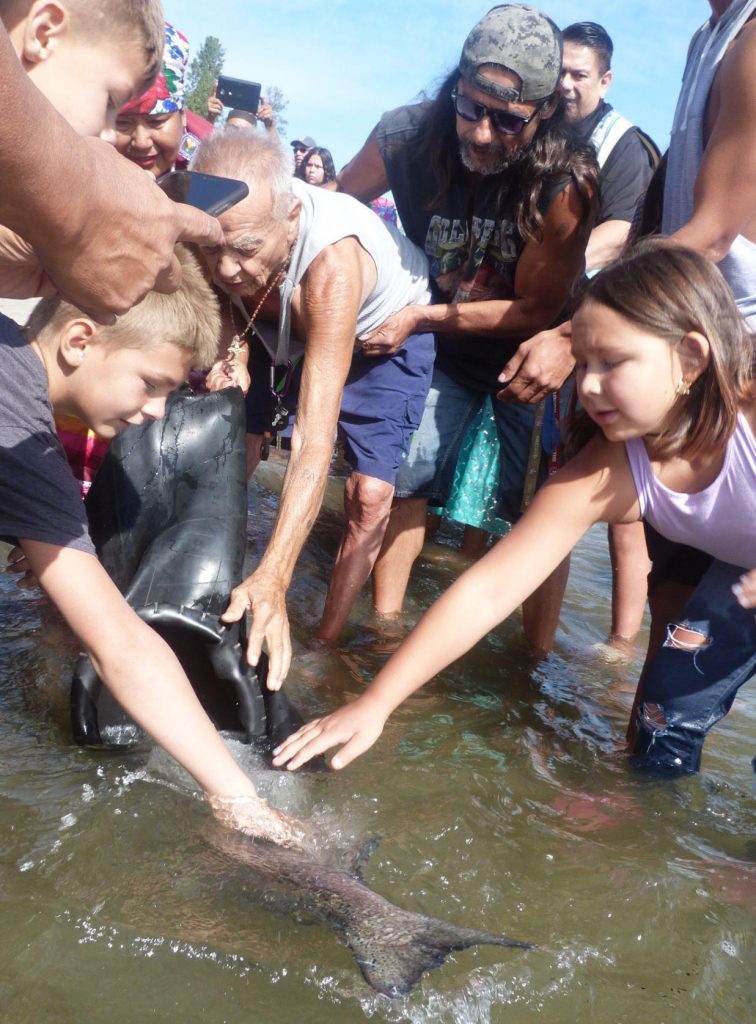
Upper Columbia United Tribes begin reintroducing salmon above Chief Joseph, Grand Coulee
The Upper Columbia United Tribes have begun a process to reintroduce anadromous fish above Chief Joseph and Grand Coulee dams. The tribes have been working with state and Federal agencies on the project.
In a report to the Council in September, Rodney Cawston, the Chair of the Colville Business Council of the Confederated Tribes of the Colville Reservation, outlined the phased-approach for salmon reintroduction. Phase 1 of the plan, which is now complete, explored the capacity for fish production, appropriate donor stocks, disease risks, and fish passage options. Phase 2, which is now underway, focuses on experimental, pilot-scale salmon reintroductions and interim passage facilities. Phase 3 involves constructing permanent passage facilities and supporting propagation facilities and improving habitat. Phase 4 addresses monitoring, evaluation, and adaptive management along with more habitat improvements.
This year, the Confederated Tribes of the Colville Reservation held ceremonies and released adult salmon in the upper Columbia, where passage has been blocked for over 80 years. The cultural and economic value of salmon is a long-recognized aspect of the Pacific Northwest.
The Northwest Power Planning Council has estimated that before 1850, 14.7 percent of all Columbia Basin spring Chinook originated above where Chief Joseph Dam now stands. Sixteen percent of summer Chinook, 14 percent of fall Chinook, 17.3 percent of coho, 10.5 percent of steelhead, and 64.7 percent of sockeye originated from the same area.
Council adopts final alternatives for salmon season start date, KMZ boundary
The Council has adopted final preferred alternatives for an amendment to the salmon plan that change the effective date of annual fisheries from May 1 to May 16 and move the southern boundary of the Klamath Management Zone from Horse Mountain 5 nm north to 40° 10′ N. lat. Amendment 20 also includes several housekeeping items.
NMFS has stated that completing the Federal regulatory process in time for the fishery start date has been a challenge in recent years.The 2019 and 2020 regulations for ocean salmon fisheries could not be processed in time for the traditional start date, May 1.
The southern boundary of the Klamath Management Zone is being changed to simplify management of the fishery as the new boundary is the same as that used to manage groundfish fisheries. Fishermen also noted safety concerns with maneuvering near the boundary due to currents and bathymetry in that area.
The next step is to update the Pacific Coast Salmon Fishery Management Plan with the changes and any Council Operating Procedures affected by the changes. The change should be in place by May 2021.
Southern Resident Killer Whale ESA consultation alternatives adopted
The Southern Resident Killer Whale Workgroup has been developing alternatives to address the NMFS consultation on the effects of ocean salmon fisheries on Southern Resident killer whales. In September the workgroup provided, and the Council adopted, a purpose and need statement, a scope of action, and a range of alternatives.
The Workgroup assessed the effects of Council-area ocean salmon fisheries on the Chinook salmon prey base of Southern Resident killer whales, and recommended management tools to further limit fishery impacts on the whales if fishery management modifications are deemed necessary. Their assessment and recommendations will help inform NMFS’ Endangered Species Act consultation and biological opinion.
The alternatives are currently available for public review, and include a status quo fishery management approach, options for a Chinook abundance threshold north of Cape Falcon, Oregon, and a list of actions that could be taken if abundance falls below that threshold. In addition, the Workgroup recommended reevaluating the conservation objectives for Sacramento River fall Chinook and Klamath River fall Chinook, and developing an age-structured stock assessment for Sacramento River fall Chinook.
The Council will consider adopting a final preferred alternative in November.